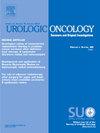改善高危前列腺癌患者的生殖系检测
IF 2.4
3区 医学
Q3 ONCOLOGY
Urologic Oncology-seminars and Original Investigations
Pub Date : 2025-03-01
DOI:10.1016/j.urolonc.2024.12.074
引用次数: 0
摘要
推荐对高风险的局限性、局部晚期和转移性前列腺癌患者进行生殖基因检测。尽管有这样的建议,但生殖系检测在前列腺癌中的应用并不理想。有一个新的策略需要参与肿瘤临床医生和患者生殖系检测和整合生殖系检测到临床。方法:我们设计了一项单臂研究者发起的研究,利用视频教育作为向符合国家癌症综合网络生殖系检测标准的患者提供检测前咨询的手段。纳入标准包括大于或等于18岁的男性,诊断为前列腺癌的任何组织学,以及生殖系检测的NCCN指征。同意参加这项研究的患者接受了一对一的面对面教育,并观看了有关生殖细胞检测的教育视频。患者完成干预前和干预后的问卷,以评估他们对干预的了解和满意度。主要终点是参与研究的患者中接受生殖系检测的比例。关键的次要终点包括教育干预对生殖细胞检测知识变化的影响和患者对生殖细胞检测的看法。结果本研究共入组58例患者,50例患者完成了研究方案。白人占78.0%(39/50),非西班牙裔占92.0%(46/50),英语占98.0%(49/50),大学学历占70%(35/50)。大多数患者为局限性高风险疾病46.0%(23/50)或转移性去势敏感前列腺癌26.0%(13/5)。总体而言,82.0%(41/50)的患者在干预后选择参加种系检测。在订购的检查中,26.0%(13/50)是由泌尿科医生进行的,74.0%(37/50)是由内科肿瘤科医生进行的。在该队列中,12.0%(6/50)的患者有P/LP突变,14.0%(7/50)的患者有VUS。影响患者进行基因检测的最重要因素将是结果是否指导治疗选择。影响患者不进行基因检测的最重要因素是结果是否没有临床价值。大多数患者在干预前对遗传知识的了解程度较高,遗传知识测试平均得分为9.1分(满分为11分)。干预后遗传知识没有显著增加或减少(p = 0.88)。大多数患者对干预感到满意,并认为其有用94%(47/50)。结论视频干预后生殖系检测的使用率很高,大多数患者已经了解了遗传学,但在干预后更有可能继续进行检测,如果这将影响他们的治疗。此外,应将虚拟教具的使用纳入临床实践,以提高种系检测率。本文章由计算机程序翻译,如有差异,请以英文原文为准。
IMPROVING GERMLINE TESTING IN AT-RISK PATIENTS WITH PROSTATE CANCER
Introduction
Germline testing is recommended for patients with high risk localized, locally advanced, and metastatic prostate cancer. Despite this recommendation, implementation of germline testing in prostate cancer has been suboptimal. There is a need for novel strategies to engage oncology clinicians and patients in germline testing and integrate germline testing into the clinic.
Methods
We designed a single-arm investigator-initiated study utilizing video education as a means of delivering pre-test counseling to patients who meet the National Cancer Comprehensive Network testing criteria for germline testing. Inclusion criteria includes men greater than or equal to 18 years of age, diagnosis of prostate cancer of any histology, and NCCN indication for germline testing. Patients who consented to the study underwent a one-on-one in-person education session with an educational video about germline testing. Patients completed pre and post-intervention questionnaires to assess their knowledge and satisfaction with the intervention. The primary endpoint was the proportion of patients who underwent germline testing among those enrolled to the study. Key secondary endpoints include the impact of education intervention on change in knowledge of germline testing and patient perceptions of germline testing.
Results
The study enrolled a total of 58 patients, 50 patients completed the study protocol. The majority of patients were White 78.0% (39/50), Non-Hispanic 92.0% (46/50), spoke English 98.0% (49/50), and were college educated 70% (35/50). The majority of patients had high risk localized disease 46.0% (23/50) or metastatic castrate sensitive prostate cancer 26.0% (13/5). Overall, 82.0% (41/50) of patients choose to participate in germline testing following the intervention. Of the tests ordered, 26.0% (13/50) were by urologists and 74.0% (37/50) were by medical oncologists. In this cohort 12.0% (6/50) of patients had a P/LP mutation, 14.0% (7/50) had a VUS. The most important factor influencing patients to pursue genetic testing would be if the results guide treatment selection. The most important factor influencing patients to not pursue genetic testing would be if the results had no clinical value. Most patients had a high level of understanding of genetics knowledge prior to the intervention with a mean score of 9.1 out of 11 in the genetics knowledge test. There was no significant increase or decrease genetics knowledge after the intervention (p = 0.88). A majority of patients were satisfied with the intervention and found it useful 94% (47/50).
Conclusions
The uptake of germline testing after the video intervention was high, most patients already had an understanding of genetics, but were more likely to pursue testing after the intervention and if it would influence their treatment. Furthermore, utilization of virtual educational aids should be integrated into clinical practice to increase germline testing rates.
求助全文
通过发布文献求助,成功后即可免费获取论文全文。
去求助
来源期刊
CiteScore
4.80
自引率
3.70%
发文量
297
审稿时长
7.6 weeks
期刊介绍:
Urologic Oncology: Seminars and Original Investigations is the official journal of the Society of Urologic Oncology. The journal publishes practical, timely, and relevant clinical and basic science research articles which address any aspect of urologic oncology. Each issue comprises original research, news and topics, survey articles providing short commentaries on other important articles in the urologic oncology literature, and reviews including an in-depth Seminar examining a specific clinical dilemma. The journal periodically publishes supplement issues devoted to areas of current interest to the urologic oncology community. Articles published are of interest to researchers and the clinicians involved in the practice of urologic oncology including urologists, oncologists, and radiologists.

 求助内容:
求助内容: 应助结果提醒方式:
应助结果提醒方式:


